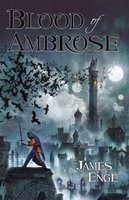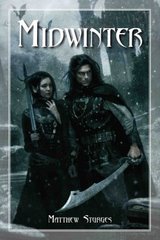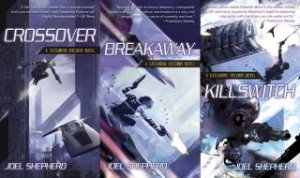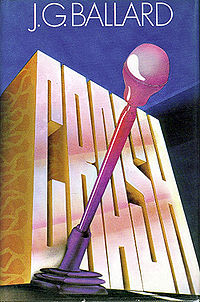Diesmal vorgezogen habe ich den Wochenrückblick, denn morgen erscheint Teil vier der beliebten Reihe „Frühlingsbücher“, außerdem bin ich ganztägig auf der FedCon in Bonn. Dazu dann mehr am 2. Mai.
Los geht‘s (es sind keine Meldungen über Schweinegrippe dabei):
- Am letzten Wochenende gab‘s in Hannover eine wissenschaftliche Tolkien-Tagung. Thema: Gewalt, Konflikt und Krieg in Mittelerde. Im Hörsaal vorne stand auch Dr. Frank Weinreich, dessen wirklich sehr gelehrten Tagungsbeitrag ihr hier auf Englisch nachlesen könnt. Gemerkt hat auch Spiegel Online, dass auf höchstem Niveau diskutiert wurde und eine längere DPA-Meldung veröffentlicht. Gar nicht niveauvoll sind hingegen die Diskussionsbeiträge diverser SpOn-Leser dazu.
- Weiter mit Fantasy: Das Fachmagazin Buchmarkt hat mit der Literaturagentin Natalja Schmidt ein ausführliches Interview über die Vermittlung von Fantasyromanen geführt. Schmidt vertritt gemeinsam mit Julia Abrahams seit dem Jahr 2005 hauptsächlich deutschsprachige Autoren, darunter Christoph Hardebusch, Stephan Russbült und Daniela Knor.
- Und was wird aus dem seit Jahrhunderten bewährten Trägermedium für Literatur? Jürgen Neffe hört schon den Schwanengesang des gedruckten Buches und sieht uns in der Morgendämmerung des E-Book-Epochenwandels. In seinem Artikel auf Zeit Online schreibt er zwar von „entleibten Medien“, beschwört aber gleichzeitig die Chancen, die die neue Lesewelt in sich birgt: „Es wird runde Bücher geben, endlose Texte ohne Anfang und ohne Ende“.
- Auch FAZ.net thematisiert die Frage blättern oder klicken. Autor Peter Richter vermutet allerdings, dass die Wahrheit wie immer in der Mitte liegt, denn „die Digitalisierung dürfte den Ausstoß an bedrucktem Papier noch deutlicher steigern als seinerzeit die Einführung des ,papierlosen Büros‘“.
- Wie anregend: Das Beste aus analogen und digitalen Welten verbindet die fabulöse Espresso Book Machine. Wie das funktioniert, wenn man in so ein Dings vorne Einsen und Nullen füttert, damit hinten ein Buch herauskommt, beschreibt Times Online hier.
- Ah, Steampunk: Wieviel Dampf so ein neo-viktorianischer und retro-futuristischer Buchautomat produzieren könnte, ist möglicherweise im „Asylum“ zu bestaunen, dem ersten Steampunk-Festival im Vereinigten Königreich, allerdings erst im September 2009.
- Gerade vorbei ist die „Elf Fantasy Fair“, die am letzten Wochenende rund 25.000 Fans ins niederländische Utrecht gelockt hat. Auf Opinio gibt‘s einen Bericht dazu.
- In ihrer Rubrik „Hero Complex“ schreibt die Los Angeles Times über eine Versteigerung der besonderen Art: Einzigartige Film-Memorabilia aus der Sammlung des legendären Forrest J. Ackerman, darunter so begehrenswerte Preziosen wie Bela Lugosis Ring und Umhang, kamen unter den Hammer.
- Nochmal Horror, nochmal Spiegel: In der Rubrik „einestages“ kann man durch eine Fotogalerie der 50 schlechtesten Horrorfilmposter blättern. Mein Favorit: „Devil‘s Tower – Der Schreckensturm der Zombies“.
- Wieviel von einem guten Titel abhängt, weiß auch Dirk van den Boom. Er kündigt die von ihm und Oliver Naujoks herausgegebene Military-SF-Anthologie für den Spätsommer an und sucht noch nach einem griffigen Titel dafür. Auf meinen Vorschlag „Another one bites the Stardust“ ist er bislang nicht näher eingegangen…
Schönes langes Wochenende!
 „Three strange worlds that have enchanted me recently are: the eerie haunted Duma Key, in Florida; the murder-torn Jewish enclave of Alaska; and the far-future worlds of the Universe where humans once upon a time vanquished the Stargazer alien.
„Three strange worlds that have enchanted me recently are: the eerie haunted Duma Key, in Florida; the murder-torn Jewish enclave of Alaska; and the far-future worlds of the Universe where humans once upon a time vanquished the Stargazer alien. Halbzeit bei den Frühlingsbüchern.
Halbzeit bei den Frühlingsbüchern. Heute: John DeNardo, in seinen eigenen Worten „…one of the rabid cage-monkeys at
Heute: John DeNardo, in seinen eigenen Worten „…one of the rabid cage-monkeys at  US-Autor
US-Autor 
 This month (April) sees the debut of James Enge’s
This month (April) sees the debut of James Enge’s  Last month, we released Matthew Sturges‘
Last month, we released Matthew Sturges‘ 
 US-Autor Jeff Vandermeer (Shriek) berichtet gerade auf seinem
US-Autor Jeff Vandermeer (Shriek) berichtet gerade auf seinem 







